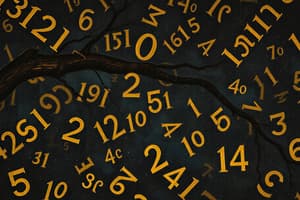Podcast
Questions and Answers
What is the ordered pair representation of the imaginary unit i?
What is the ordered pair representation of the imaginary unit i?
- (1, 1)
- (0, 1) (correct)
- (1, 0)
- (0, 0)
Which of the following statements about complex numbers is true?
Which of the following statements about complex numbers is true?
- A complex number can be written as a + bi, where a and b are real numbers. (correct)
- A complex number is always an imaginary number.
- A complex number is always purely imaginary.
- A complex number is always a real number.
What is the condition for a complex number to be imaginary?
What is the condition for a complex number to be imaginary?
- Its imaginary part is zero.
- Its imaginary part is non-zero. (correct)
- Its real part is non-zero.
- Its real part is zero.
What is the relationship between the set of real numbers (R) and the set of complex numbers (C)?
What is the relationship between the set of real numbers (R) and the set of complex numbers (C)?
How can a complex number be represented?
How can a complex number be represented?
What is the value of |z| if iz² - z = 0?
What is the value of |z| if iz² - z = 0?
If z₁ = x₁ + iy₁ and z₂ = x₂ + iy₂, where x₁, x₂, y₁, y₂ ∈ R, and 0 < x₁ < x₂, y₁ = y₂, then which of the following is true?
If z₁ = x₁ + iy₁ and z₂ = x₂ + iy₂, where x₁, x₂, y₁, y₂ ∈ R, and 0 < x₁ < x₂, y₁ = y₂, then which of the following is true?
If z = a + ib, what is the argument of z?
If z = a + ib, what is the argument of z?
What is the value of i²?
What is the value of i²?
What is the representation of a complex number z = a + ib in the complex plane?
What is the representation of a complex number z = a + ib in the complex plane?
What is the value of i^2 in complex numbers?
What is the value of i^2 in complex numbers?
Which of the following is a correct representation of a complex number?
Which of the following is a correct representation of a complex number?
What is the value of -a when a is a positive real number?
What is the value of -a when a is a positive real number?
What is the property of the imaginary unit i?
What is the property of the imaginary unit i?
What is the set of complex numbers denoted by?
What is the set of complex numbers denoted by?
What is the property of addition of complex numbers that satisfies z1 + z2 = z2 + z1?
What is the property of addition of complex numbers that satisfies z1 + z2 = z2 + z1?
Which of the following is a property of multiplication of complex numbers?
Which of the following is a property of multiplication of complex numbers?
What is the additive inverse of a complex number z = a + ib?
What is the additive inverse of a complex number z = a + ib?
What is the identity element for multiplication of complex numbers?
What is the identity element for multiplication of complex numbers?
What is the property of complex numbers that satisfies z1(z2 + z3) = z1z2 + z1z3?
What is the property of complex numbers that satisfies z1(z2 + z3) = z1z2 + z1z3?
If z₁ = a + ib and z₂ = c + id, what is the value of z₁ + z₂?
If z₁ = a + ib and z₂ = c + id, what is the value of z₁ + z₂?
What is the value of z₁ - z₂ if z₁ = 2 + 3i and z₂ = 1 + 2i?
What is the value of z₁ - z₂ if z₁ = 2 + 3i and z₂ = 1 + 2i?
What can be said about the imaginary part of a complex number if it is a purely imaginary number?
What can be said about the imaginary part of a complex number if it is a purely imaginary number?
If z is a complex number, what is the relationship between z and its conjugate?
If z is a complex number, what is the relationship between z and its conjugate?
What is the result of multiplying a complex number by its conjugate?
What is the result of multiplying a complex number by its conjugate?
If z₁ = x₁ + iy₁ and z₂ = x₂ + iy₂, where x₁, x₂, y₁, y₂ ∈ R and x₁ < x₂, y₁ > y₂, then which of the following is true?
If z₁ = x₁ + iy₁ and z₂ = x₂ + iy₂, where x₁, x₂, y₁, y₂ ∈ R and x₁ < x₂, y₁ > y₂, then which of the following is true?
If z = a + ib, where a, b ∈ R, then which of the following is a property of z?
If z = a + ib, where a, b ∈ R, then which of the following is a property of z?
If z = x + iy, where x, y ∈ R, then the principal value of arg(z) lies in which of the following intervals?
If z = x + iy, where x, y ∈ R, then the principal value of arg(z) lies in which of the following intervals?
If z₁ = x₁ + iy₁ and z₂ = x₂ + iy₂, where x₁, x₂, y₁, y₂ ∈ R, then which of the following is true?
If z₁ = x₁ + iy₁ and z₂ = x₂ + iy₂, where x₁, x₂, y₁, y₂ ∈ R, then which of the following is true?
If z = x + iy, where x, y ∈ R, then which of the following is the polar form of z?
If z = x + iy, where x, y ∈ R, then which of the following is the polar form of z?
Flashcards are hidden until you start studying




